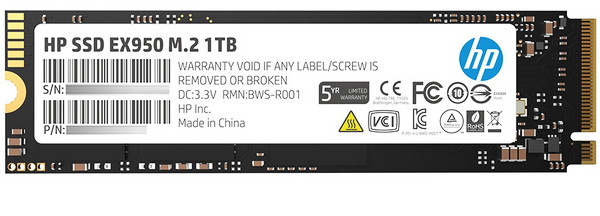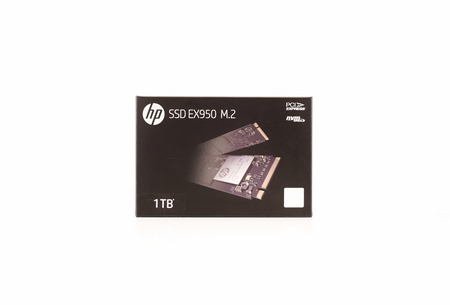INTRODUCTION

Because of their impressive read and write performance numbers and small form factor M.2 NVMe PCIe SSD drives are becoming more popular by the day. On top of that the recent introduction of the new Intel Z490 and AMD B550 motherboard models should also help boost sales numbers so it's no wonder that there's not a single storage media manufacturer that hasn't shifted its focus in the design and manufacture of such drives. HP was never that much into storage media manufacturing and so it wasn't only until a while back that they came to an agreement with BIWIN Storage (one of the largest Chinese storage media OEM's currently) to produce SSDs (internal and portable) and RAM modules using their brand name and of course their "strict" performance and quality specifications. Today with me i have one such drive and more specifically the EX950 1TB model.
HP Inc. (NYSE: HPQ) creates technology that makes life better for everyone, everywhere. Through our product and service portfolio of personal systems, printers and 3D printing solutions, we engineer experiences that amaze. More information about HP Inc. is available at www.hp.com.
Just like the KC2000/2500 models by Kingston the EX950 line of M.2 NVMe PCIe SSDs by HP (currently available in 512GB/1TB/2TB capacities) uses the same SM2262EN 8-channel NAND flash controller by Silicon Motion so right from the get go it's clear that this is among the fastest drives of its type in the market today. To be more precise HP states performance numbers of 3500MB/s in reads and 2900MB/s in writes for the entire EX950 family and as for the SM2262EN controller once again you can expect top-end features like Silicon Motion’s proprietary NANDXtend error-correcting code (ECC), datapath protection, end to end data protection with SRAM ECC, S.M.A.R.T, TRIM, NCQ, thermal-throttling, active garbage collection, DevSleep (device sleep), LDPC (Low Density Parity Check), SLC write acceleration (algorithms for optimal sustained performance), AES-XTS 256bit hardware encryption, TCG Opal 2.0 and IEEE-1667 (rendering all drives fully compatible with Microsoft's eDrive and EU's GDPR). Unlike however its immediate competition the company behind the EX950 decided to pair the SM2262EN controller with 64 layer 3D TLC NAND flash by Micron and DRAM by Nanya. HP covers the entire EX950 line with a rather generous 5 year limited warranty and as for endurance numbers the reported numbers are 320TBW for the 512GB variant, 650TBW for the 1TB variant and 1400TBW for the 2TB variant.
SPECIFICATIONS AND FEATURES

PACKAGING AND CONTENTS
HP uses a medium sized black box that has a partial product picture at the front along with the company logo, capacity and SSD type.
A disclaimer is printed at the rear of the box right over the 5 year limited warranty logo and several certifications.
The only thing you'll be getting with the EX950 is a small screw and the quick start guide / warranty statement paper.
THE EX950 1TB
The EX950 1TB M.2 PCIe 3.0 NVMe SSD follows the typical 2280 form factor (22mm wide and 80mm long).


 At the top of the drive we find the SM2262EN NAND flash controller, 512MB DRAM module and two NAND flash modules by Micron (256GB each in size).
At the top of the drive we find the SM2262EN NAND flash controller, 512MB DRAM module and two NAND flash modules by Micron (256GB each in size).


 Turning the drive over we find yet another 512MB DRAM module and two more Micron NAND flash modules.
Turning the drive over we find yet another 512MB DRAM module and two more Micron NAND flash modules.
TEST BED


TESTING METHODOLOGY
After over 12 years of testing solid state drives, i’ve concluded that it's almost impossible for any single benchmark suite to accurately measure their performance and that's why in certain benchmark suites we see amazing read/write performance numbers with some drives while in others things are quite different. The reason behind this is that some benchmarking suites are configured to read and write random chunks of data while others read and write constant (sequential) ones. So that's why i always use a very wide selection of benchmarking suites including AIDA64, HD Tach RW, HD Tune Pro, Crystal Disk Mark, Sisoftware Sandra Pro, AS SSD, IOmeter and ATTO. To get the most accurate results each test gets repeated a total of 6 times with the average performance numbers recorded into our charts*. Also, as of February 25th 2015 our results will also include the Storage Networking Industry Association’s (SNIA) IOMeter tests. These tests include a 12 Hour write test used to “simulate” performance degradation over time and a mixed workload test which basically shows what you can expect when using an SSD continuously for roughly two hours. Unfortunately, due to the time required for these tests we repeat them a total of 3 times and not 6 as the above.
Many people have made inquiries about our charts in the past so once again please do keep in mind that the Charts have the average performance numbers of each drive recorded and not the peak (highest) ones. Also, although every single one of these programs can help potential buyers choose the right drive for their needs you should also remember that from any kind of benchmark up to real world usage the gap is not small (and usually most differences will go unnoticed by most people). All tests were performed in a fresh Windows 10 Pro x64 installation complete with every update up to the date of this review.
* Since November 2018 our SSD comparison charts have been divided to 2.5” and M.2 models to reduce their growing size.
TEST RESULTS - AIDA64 / ATTO


TEST RESULTS - HD TACH RW / HD TUNE PRO


TEST RESULTS - SISOFTWARE SANDRA PRO / CRYSTAL DISK MARK


TEST RESULTS - AS SSD / IOMETER


TEST RESULTS - IOMETER SNIA

CONCLUSION

Before i continue I’d like to point out that there's a firmware out there which according to BIWIN improves some performance numbers of the EX950 all the way up to 10%. However, after trying to install it (there's no click and forget installer currently) the process got stuck at 25% returning an ID mismatch message so i didn't end up using that firmware for this review. Now 10% may not be a huge deal (especially since it's not applicable for all tests) but it's still good to have so i do hope an easier to use (not to mention bug-free) installer finds its way to the HP support pages soon. Even without that firmware however the EX950 is still a very fast M.2 NVMe SSD and as you can clearly see from the charts it exchanges blows with the KC2500 model by Kingston which is clearly among the two fastest overall SSDs to arrive in the lab, at least to date. Performance aside not much to say about the EX950, durability is also good and the 5-year limited warranty is certainly not something we see a lot in this industry (aside Kingston that is).
At the moment of this review the EX950 1TB NVMe SSD by HP retails for USD147.96 inside the USA (Amazon.com) and for 160.87Euros inside the EU (Amazon.de) a price which is really not bad for this specific "package". Overall the EX950 1TB represents a very good deal for both consumers and professionals alike, it's got impressive read and write performance (even more so with the upcoming firmware), it does very well in terms of durability (650TBW) and as for warranty well 5 years means you will probably have moved to another model by then (and if not it's always good to have a long warranty period). Because of all of the above there's simply no doubt that the EX950 1TB NVMe SSD by HP deserves our Golden Award.

PROS
- Near Excellent Performance (Up To 3500MB/s Read & 2900MB/s Write)
- Sustained Performance Levels (SNIA Tests)
- Endurance (650TBW)
- 5 Years Warranty
CONS
- Thermal Throttling (During Our SNIA Tests)
- Current Firmware Update Procedure (Complicated)

 O-Sense
O-Sense













.png)

